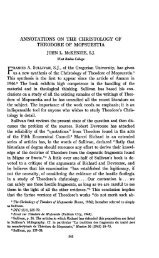episkopë and episkopos: the new testament evidence - Theological ...
episkopë and episkopos: the new testament evidence - Theological ...
episkopë and episkopos: the new testament evidence - Theological ...
You also want an ePaper? Increase the reach of your titles
YUMPU automatically turns print PDFs into web optimized ePapers that Google loves.
332 THEOLOGICAL STUDIES<br />
church while supervising a whole group of churches with a common<br />
heritage. It was only in a partial way, <strong>the</strong>n, that <strong>the</strong> local bishops<br />
succeeded to <strong>the</strong> apostolic care for <strong>the</strong> churches. (Later, with <strong>the</strong> development<br />
of <strong>the</strong> patriarchates <strong>and</strong> of <strong>the</strong> papacy, care for a larger group of<br />
churches found again a vehicle of expression.) In all this one should note<br />
that in <strong>the</strong> NT succession in pastoral care is to <strong>the</strong> apostles in <strong>the</strong> Pauline<br />
sense. The idea that <strong>the</strong> Twelve were apostles (<strong>and</strong> eventually that <strong>the</strong>y<br />
were <strong>the</strong> only apostles to be reckoned with) would ultimately lead to <strong>the</strong><br />
underst<strong>and</strong>ing that <strong>the</strong>y were <strong>the</strong> apostles to whom <strong>the</strong> local church<br />
leaders succeeded. In <strong>the</strong> NT, however, <strong>the</strong> Twelve are never described<br />
as being <strong>the</strong> first to bring Christianity to an area <strong>and</strong> in that sense<br />
establish a local church; <strong>and</strong> so <strong>the</strong> NT never raises <strong>the</strong> issue of succession<br />
to <strong>the</strong>ir pastoral care. 22<br />
Moving on from <strong>the</strong> apostolic delegates to <strong>the</strong> local church leaders<br />
described in <strong>the</strong> Pastorals, we find that in <strong>the</strong>se letters <strong>the</strong>re have<br />
emerged established offices for which qualifications are given (1 Tim 3;<br />
Titus 1). Some of <strong>the</strong> qualifications are institutional, so that no matter<br />
what abilities a person may have, that person can be rejected because of<br />
stipulations that are only secondarily related to what <strong>the</strong> person will be<br />
doing, e.g., no recent convert nor a person who has been married a second<br />
time is eligible to be a presbyter. This factor, plus <strong>the</strong> idea of appointment<br />
of presbyter-bishops by an apostolic delegate, means that personally<br />
experienced or claimed charisms have ceded to community acknowledgment<br />
in determining who shall have supervision. Unfortunately, outside<br />
of <strong>the</strong>se three letters which deal with apostolic delegates, we know very<br />
little about how communities at this period did determine who would<br />
have supervision. Didache 15:1 indicates that <strong>the</strong> community itself could<br />
select leaders; but in o<strong>the</strong>r areas <strong>and</strong> times it may well have been that<br />
<strong>the</strong> leaders of sister-churches intervened, or that <strong>the</strong> presbyter-bishops<br />
sought to have <strong>the</strong>ir own children succeed <strong>the</strong>m. There is nothing in <strong>the</strong><br />
NT literature about a regular process of ordination. (And a fortiori <strong>the</strong>re<br />
is nothing to support <strong>the</strong> <strong>the</strong>sis that, by a chain of laying on of h<strong>and</strong>s,<br />
every local presbyter-bishop could trace a pedigree of ordination back to<br />
"<strong>the</strong> apostles." 23 ) Nor do we know whe<strong>the</strong>r church offices were held for<br />
a limited time or for life.<br />
Let us now turn to <strong>the</strong> designation of local church officials. 24 In <strong>the</strong><br />
Pastorals <strong>the</strong>re are two offices set up for <strong>the</strong> pastoral care of <strong>the</strong><br />
22 See, however, <strong>the</strong> discussion of 1 Peter below, n. 31.<br />
23 For ecumenical purposes, a study should be made on how <strong>the</strong> impression has been<br />
created (erroneously in my judgment) that such a "tactile" succession is a doctrine of <strong>the</strong><br />
Roman Catholic Church.<br />
24 It is not germane to this paper on church supervision to discuss o<strong>the</strong>r community roles<br />
or orders recognized in <strong>the</strong> Pastorals (<strong>and</strong> o<strong>the</strong>r NT works), e.g., widows <strong>and</strong> virgins, since<br />
<strong>the</strong>y are not recorded as having exercised "supervision."
















